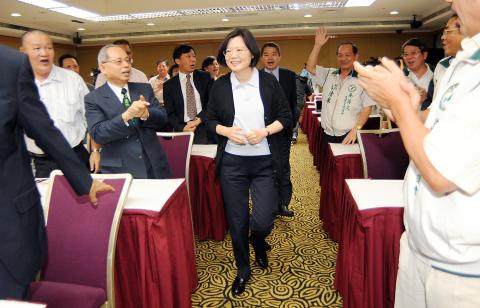The Democratic Progressive Party (DPP) will reinvent itself as a “moderate reformist” party to reassure and attract swing voters ahead of next year’s presidential election, DPP Chairperson Tsai Ing-wen (蔡英文) said yesterday.
Speaking to a group of Taiwanese businesspeople based in Southeast Asian countries, the DPP presidential candidate said the support of swing voters would be “crucial” in January’s election.
The swing vote is expected to be the main battleground between Tsai and the Chinese Nationalist Party (KMT) candidate, President Ma Ying-jeou (馬英九).

Photo: Lo Pei-der, Taipei Times
While the definition of swing voters in Taiwan is still up for debate, it is true that some voters stress social stability above all else, Tsai said, adding: “And the Chinese Nationalist Party has been taking advantage of this mindset to woo the so-called ‘swing voters’ and to evade reform in the past.”
The KMT has given the public the impression it wants to duplicate the era of the president Chiang Ching-kuo (蔣經國), when the country was run by an authoritative regime to achieve social stability, she said.
“The DPP will neither refuse to change for the sole purpose of stability, nor insist on reform and forget about stability,” she said.
The DPP will be moderately reformist because, as a party better at recognizing the global situation than its rival, it is able to identify the most urgently needed reforms, she said.
A good team of experienced former government officials from the DPP’s previous administrations is already in place to advance the party’s ideology, she said.
“That means we’re determined and are able to take care of the underprivileged, one of the DPP’s core values,” she added.
Outlining what would be the priorities of her administration, if elected, Tsai said two issues stand out — providing quality jobs and upgrading industrial infrastructure.
Instead of seeking temporary solutions, such as depending on China to solve any problems as the KMT does, the DPP has always insisted on finding long-term solutions that serve the best interest of the Taiwanese, she said.
The DPP is not opposed to economic exchange with China, she said, but the exchange she has in mind is one that is practiced within a normal framework and fits with international obligations in a multilateral system.
“The exchange should not be politicized either, which is the case at the moment,” she said.

Chinese Nationalist Party (KMT) Chairman Eric Chu (朱立倫), spokeswoman Yang Chih-yu (楊智伃) and Legislator Hsieh Lung-chieh (謝龍介) would be summoned by police for questioning for leading an illegal assembly on Thursday evening last week, Minister of the Interior Liu Shyh-fang (劉世芳) said today. The three KMT officials led an assembly outside the Taipei City Prosecutors’ Office, a restricted area where public assembly is not allowed, protesting the questioning of several KMT staff and searches of KMT headquarters and offices in a recall petition forgery case. Chu, Yang and Hsieh are all suspected of contravening the Assembly and Parade Act (集會遊行法) by holding

PRAISE: Japanese visitor Takashi Kubota said the Taiwanese temple architecture images showcased in the AI Art Gallery were the most impressive displays he saw Taiwan does not have an official pavilion at the World Expo in Osaka, Japan, because of its diplomatic predicament, but the government-backed Tech World pavilion is drawing interest with its unique recreations of works by Taiwanese artists. The pavilion features an artificial intelligence (AI)-based art gallery showcasing works of famous Taiwanese artists from the Japanese colonial period using innovative technologies. Among its main simulated displays are Eastern gouache paintings by Chen Chin (陳進), Lin Yu-shan (林玉山) and Kuo Hsueh-hu (郭雪湖), who were the three young Taiwanese painters selected for the East Asian Painting exhibition in 1927. Gouache is a water-based

Taiwan would welcome the return of Honduras as a diplomatic ally if its next president decides to make such a move, Minister of Foreign Affairs Lin Chia-lung (林佳龍) said yesterday. “Of course, we would welcome Honduras if they want to restore diplomatic ties with Taiwan after their elections,” Lin said at a meeting of the legislature’s Foreign Affairs and National Defense Committee, when asked to comment on statements made by two of the three Honduran presidential candidates during the presidential campaign in the Central American country. Taiwan is paying close attention to the region as a whole in the wake of a

OFF-TARGET: More than 30,000 participants were expected to take part in the Games next month, but only 6,550 foreign and 19,400 Taiwanese athletes have registered Taipei city councilors yesterday blasted the organizers of next month’s World Masters Games over sudden timetable and venue changes, which they said have caused thousands of participants to back out of the international sporting event, among other organizational issues. They also cited visa delays and political interference by China as reasons many foreign athletes are requesting refunds for the event, to be held from May 17 to 30. Jointly organized by the Taipei and New Taipei City governments, the games have been rocked by numerous controversies since preparations began in 2020. Taipei City Councilor Lin Yen-feng (林延鳳) said yesterday that new measures by